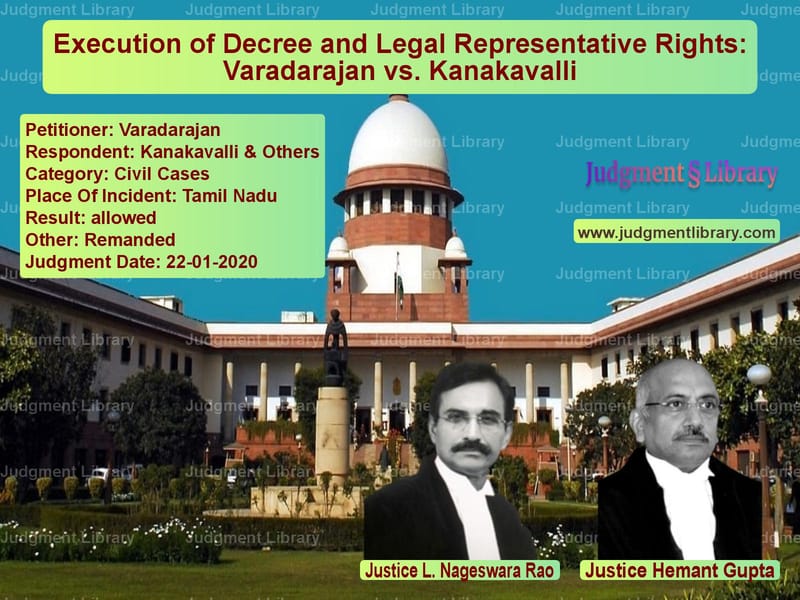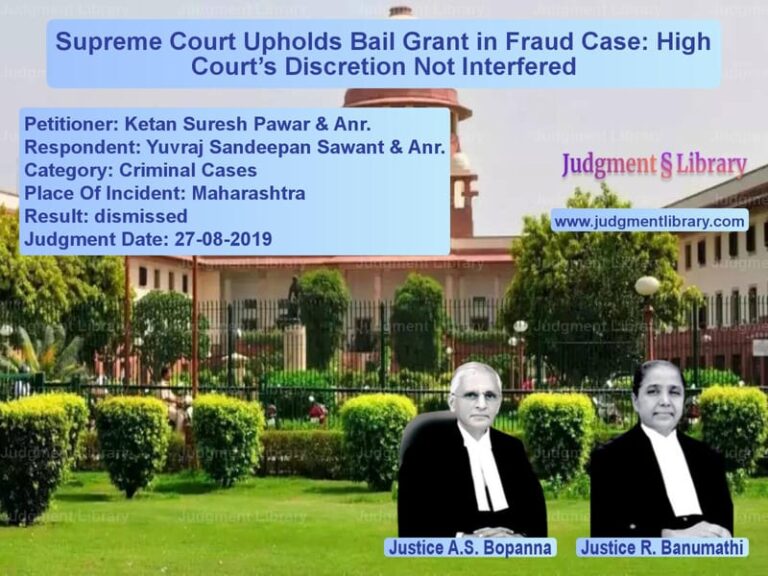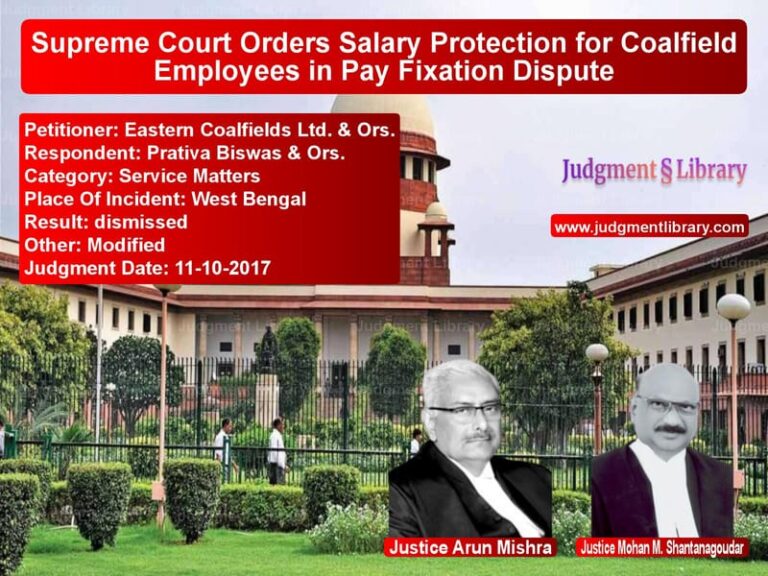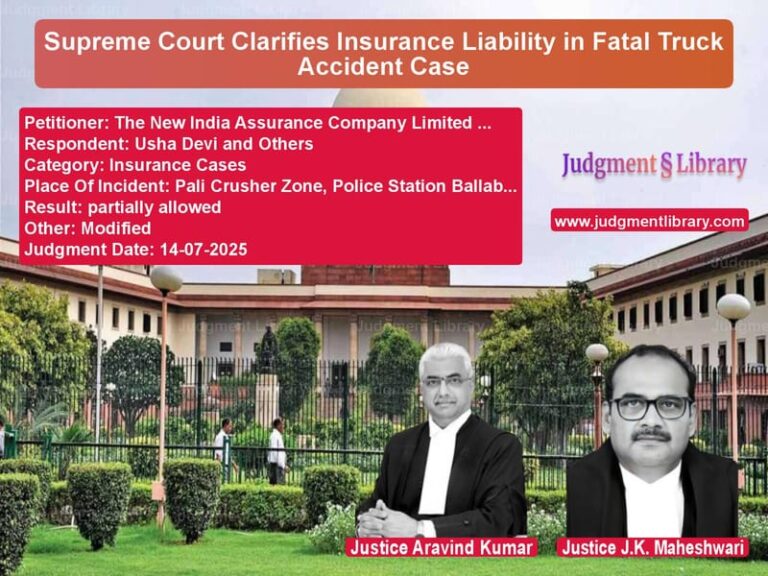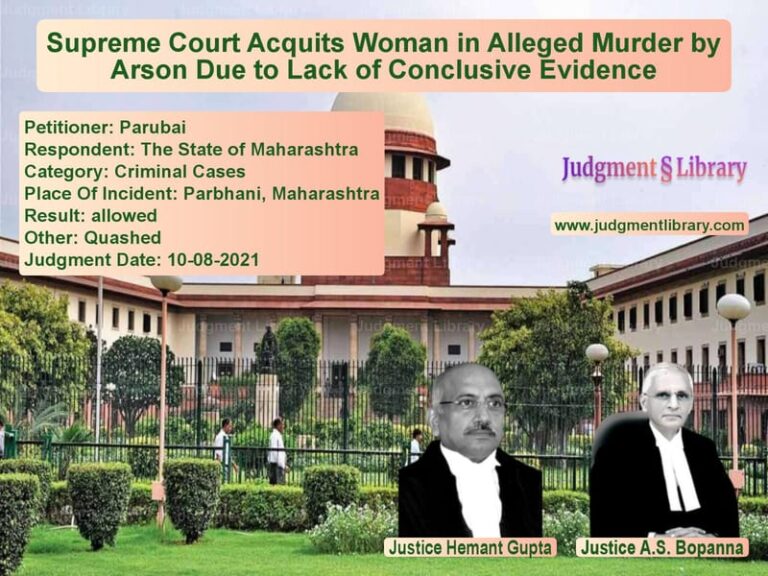Execution of Decree and Legal Representative Rights: Varadarajan vs. Kanakavalli
The case of Varadarajan vs. Kanakavalli & Others revolves around a civil dispute concerning the execution of a partition decree and the rights of a legal representative. The Supreme Court was tasked with determining whether the appellant, claiming to be a legal representative based on a will, was entitled to execute the decree passed in favor of the deceased.
Background of the Case
The appellant, Varadarajan, sought execution of a partition decree initially obtained by Umadevi, the original decree-holder. Umadevi had filed a suit for partition and separate possession as the successor of Manicka Naicker, her husband. The suit was decreed in her favor on April 7, 1989, and the decree attained finality.
In 1999, Umadevi filed for execution of the decree but passed away on July 22, 1999. The appellant, claiming to be her legal representative based on a will dated July 16, 1999, sought to execute the decree. The respondents, however, challenged the validity of the will and claimed that the appellant had no legal standing to continue the execution proceedings.
Legal Proceedings
The matter first came before the Executing Court, which allowed the appellant to proceed with the execution. However, the respondents challenged this decision before the Madras High Court, which reversed the Executing Court’s decision, citing suspicious circumstances surrounding the execution of the will. Dissatisfied with the High Court’s ruling, the appellant approached the Supreme Court.
Arguments of the Appellant (Varadarajan)
The appellant made the following key arguments:
- He was the sole legal representative of Umadevi based on a validly executed will.
- The will was properly attested and supported by witness testimonies.
- No other claimant had come forward to execute the decree, and the respondents had no legal right to challenge his status.
- The High Court erred in interfering with the findings of fact recorded by the Executing Court.
Arguments of the Respondents (Kanakavalli & Others)
The respondents countered with the following arguments:
- The will was executed under suspicious circumstances just days before Umadevi’s death.
- The appellant was not a direct heir and could not claim rights over the property.
- The Executing Court lacked the jurisdiction to decide the validity of the will.
- The High Court had rightly set aside the Executing Court’s order based on a detailed examination of the evidence.
Key Observations of the Supreme Court
The Supreme Court analyzed the case on the following issues:
- Whether the appellant was a valid legal representative under the will.
- Whether the High Court had the authority to interfere with the Executing Court’s findings.
- Whether the execution of the will was surrounded by suspicious circumstances.
The Court made the following findings:
- The appellant had provided sufficient evidence, including witness testimonies, to prove the validity of the will.
- No other legal heir had come forward to contest the execution proceedings.
- The Executing Court had the authority to recognize the appellant as the legal representative for execution purposes.
- The High Court erred in re-evaluating factual findings in a revision petition under Section 115 of the Code of Civil Procedure.
Verbatim Court Findings
The Supreme Court, while reversing the High Court’s ruling, stated:
“The Executing Court had the jurisdiction to determine the appellant’s status as a legal representative under Order XXII Rule 5 of the CPC. The High Court acted beyond its jurisdiction in re-evaluating the evidence in a revision petition.”
Additionally, the Court observed:
“In the absence of any other claimant to the estate, the appellant’s right to execute the decree should not have been questioned.”
Final Judgment
The Supreme Court ruled in favor of the appellant and restored the Executing Court’s order:
- The High Court’s judgment was set aside.
- The appellant was recognized as the legal representative entitled to execute the decree.
- The execution proceedings were allowed to continue.
Final Verdict: Appeal allowed, High Court judgment set aside, execution proceedings reinstated.
Petitioner Name: Varadarajan.Respondent Name: Kanakavalli & Others.Judgment By: Justice L. Nageswara Rao, Justice Hemant Gupta.Place Of Incident: Tamil Nadu.Judgment Date: 22-01-2020.
Don’t miss out on the full details! Download the complete judgment in PDF format below and gain valuable insights instantly!
Download Judgment: Varadarajan vs Kanakavalli & Others Supreme Court of India Judgment Dated 22-01-2020.pdf
Direct Downlaod Judgment: Direct downlaod this Judgment
See all petitions in Property Disputes
See all petitions in Succession and Wills
See all petitions in Contract Disputes
See all petitions in Judgment by L. Nageswara Rao
See all petitions in Judgment by Hemant Gupta
See all petitions in allowed
See all petitions in Remanded
See all petitions in supreme court of India judgments January 2020
See all petitions in 2020 judgments
See all posts in Civil Cases Category
See all allowed petitions in Civil Cases Category
See all Dismissed petitions in Civil Cases Category
See all partially allowed petitions in Civil Cases Category

